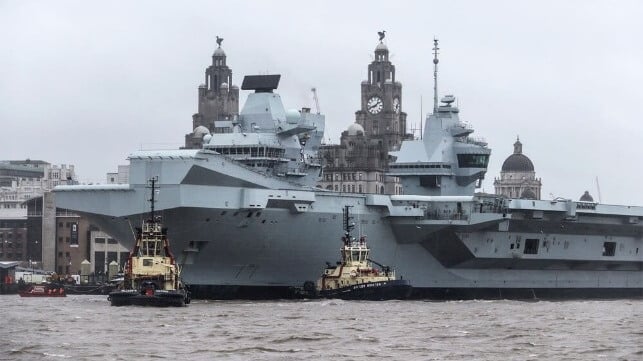Crews Operating Tugs for UK’s Royal Navy Taking Strike Vote

Around 300 crewmembers who staff tugboats operated to support the UK’s Royal Navy and provide marine services are taking a strike vote. The move comes as their union, Unite, is complaining they have been locked out of ongoing negotiations between the Ministry of Defense and service provider Serco Marine regarding the renewal of a 10-year contract valued at £1.2 billion ($1.5 million).
Unite reports it represents approximately half the tugboat captains, crewmembers, and workers employed by Serco to provide services to the Royal Navy. In addition to navigational support for everything from the pride of the fleet aircraft carriers and nuclear subs to all other naval vessels, Serco Marine is responsible for delivering fuel, water, and munitions at all Royal Navy ports, tank cleaning, and passenger transportation. Serco took over these critical roles in 2008 as part of the government’s move to privatize the Royal Maritime Auxiliary Service. Union members transferred to Serco.
According to the leadership of Unite, the Ministry of Defense and Serco are involved in negotiations for the renewal of the contract. They assert the government is looking to reduce the contract by £250 million ($310 million) which Unite says is putting nearly 100 jobs at risk.
Unite contends among the steps being discussed is a proposal to reduce the number of tugs used to move nuclear submarines. They said the proposal would see the number reduced to four tugboats from the current six to save costs. Unite’s workplace reps have informed Serco Marine that it would be in “contravention of unclear safety regulation.”
Serco confirmed to the BBC that negotiations regarding the in-port contract are ongoing. It said it was committed to keeping union members updated on any proposed changes. Serco is a government services provider with its operations in the UK focusing on defense, space, healthcare, justice and migration, transport, and citizen services.
“Both Serco and the MoD need to listen to these workers. They are not deskbound managers or bureaucrats: They are seafarers with decades of experience. Knowing how to tow an aircraft carrier or nuclear submarine according to wind, tide, and topography is just one facet of their expertise,” said Unite General Secretary Sharon Graham. “Without their input, the proposed contract risks losing vital jobs and the invaluable working knowledge that comes with them, seriously endangering the fleet’s ability to function safely.”
The voting for the possible strike action began today, February 3. It is running for two weeks. Under UK labor law, the union would have to file a notice of its intent to strike after gaining authorization. Job actions would involve Royal Navy operations at Portsmouth, Devonport, Faslane, Great Harbour Greenock, and Kyle of Lochalsh.

that matters most
Get the latest maritime news delivered to your inbox daily.
A spokesperson for the Ministry of Defense told the BBC it is a matter between the contractor and its workforce. They said it would not affect Royal Navy operations if the proposed strike proceeds.
It marks the second contentious situation the unions have been locked in with the Ministry of Defense related to services for the Royal Navy. In 2024, Nautilus and RMT (National Union of Rail, Maritime and Transport Workers) each staged a series of work slowdowns and strikes during prolonged contract negotiations for the Royal Fleet Auxiliary officers and crew. They finally agreed to the terms of the 2024 labor contract for wages and benefits at the beginning of 2025.
